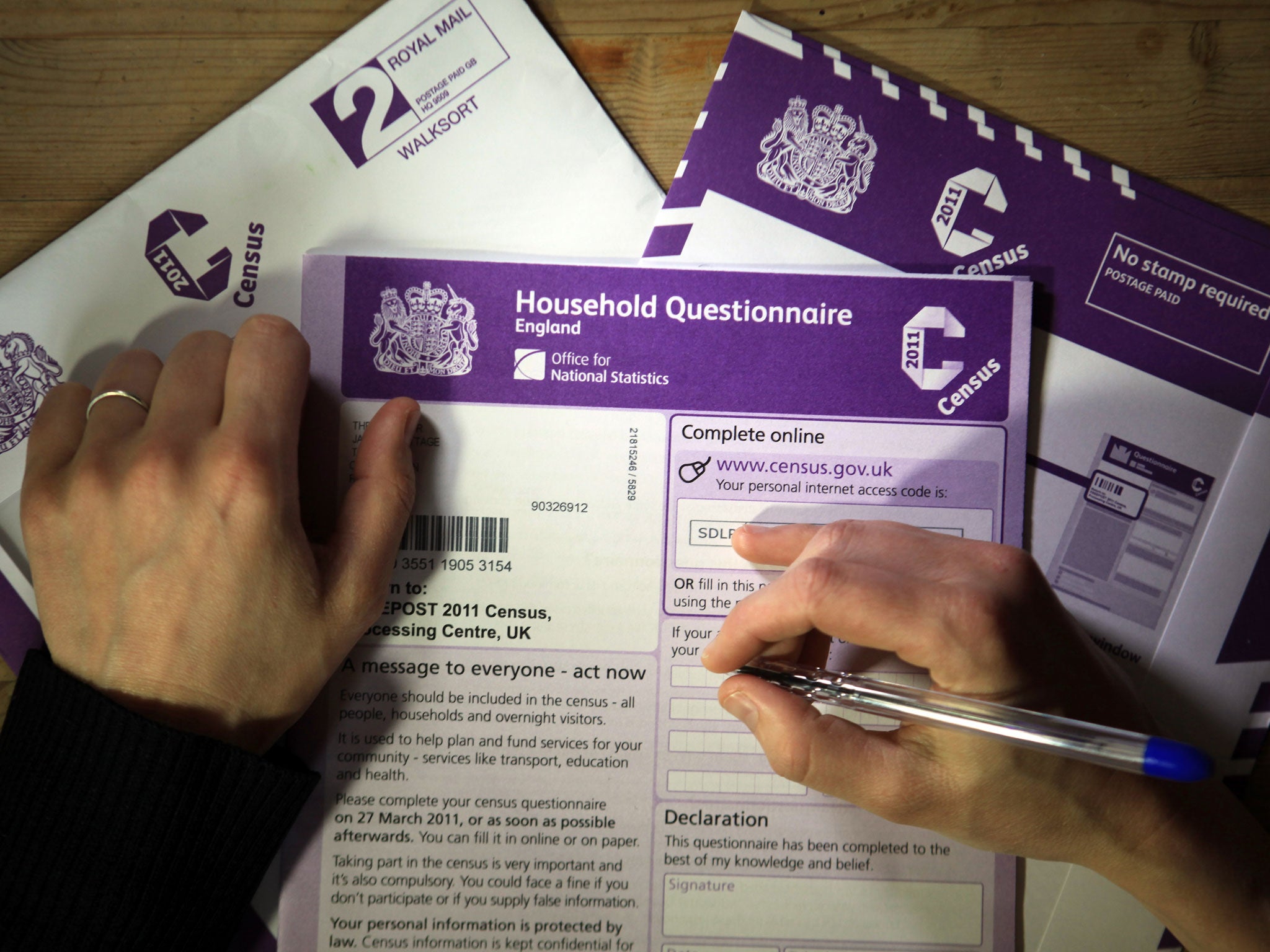The big question: How many of us will really miss the census?
The 2011 roll call of Great Britain cost £500m. Its supporters claim the information it gathered was invaluable and plans to abandon the process could cause untold damage

Your support helps us to tell the story
From reproductive rights to climate change to Big Tech, The Independent is on the ground when the story is developing. Whether it's investigating the financials of Elon Musk's pro-Trump PAC or producing our latest documentary, 'The A Word', which shines a light on the American women fighting for reproductive rights, we know how important it is to parse out the facts from the messaging.
At such a critical moment in US history, we need reporters on the ground. Your donation allows us to keep sending journalists to speak to both sides of the story.
The Independent is trusted by Americans across the entire political spectrum. And unlike many other quality news outlets, we choose not to lock Americans out of our reporting and analysis with paywalls. We believe quality journalism should be available to everyone, paid for by those who can afford it.
Your support makes all the difference.Such is the rigour of the census that even Queen Victoria was required to add her name – listing her occupation as “the Queen”. But after more than 200 years the decennial stocktake of the nation is undergoing a radical overhaul and concern is growing at the impact any changes will have on swathes of policy-making.
The Office of National Statistics (ONS) will this month begin a three-month public consultation, including a roadshow to gather the views of interested parties from local government number-crunchers to genealogists, on moves to replace the current census model with a cheaper alternative.
Prior to the last nationwide survey to fill in Britain’s demographic blanks in 2011 the Government announced its desire to scrap the census, which two years ago cost nearly £500m and employed 35,000 people to go door-to-door collecting forms for the mammoth data collection exercise.
The ONS has said that it wants to change the current model and outlined its two “front-running options” – an internet-based “modernised census” or a rolling annual survey of four per cent of the population supplemented by “administrative data” such as education or health records.
But the scrapping of two centuries of data-gathering, which has provided a resource capable of finding both obscure forebears and tailoring public policy on subjects from tackling youth disenfranchisement to take up of cycling, has provoked fears that Britain will lose a vital early warning system for social change.
Statistical experts argue that the vast amount of data gathered by the census provides a gold standard which highlights shortcomings in other public records, including the politically-vexed question of just how many people there are in Britain.
Professor Danny Dorling, of Oxford University, a leading expert on social geography, said: “We should be under no illusions that what is proposed is anything other than the abandoning of the census and that has wide-ranging implications for the way large amounts of policy is decided.
“The census is a benchmark. The 2011 census found there were 500,000 people living here that we didn’t know existed. Similarly, without the census we would not have known that mortality rates for men rose in parts of Glasgow but not elsewhere.
“It is extremely valuable and without it we will not be able to tell whether we are pulling together or dividing as a society. We will not be able to plan for the future.”
Britain differs from many countries, including Denmark and Germany, by still having a once-in-a-decade census to record information from the occupation of every Briton to religion, ethnicity and whether homes have central heating. Scandinavian nations benefit from connected banks of administrative data while others such as Germany can use data from compulsory identity cards. Canada has recently scrapped its census in favour of a voluntary online survey. Supporters of a slimmed-down UK census, including the right-leaning Policy Exchange think-tank, argue that the use of more rapidly updated records such as council tax data would be more efficient and cheaper than the current unwieldy structure.
But opponents claim the census is responsible for highlighting a raft of discrepancies to be addressed by public policy, including the tracking of mortality rates and indicators of housing inequality across Britain’s cities.
The ONS, which will report to the Government next year on its conclusions about the best methods of producing “census-type” data, insisted it had closed off no options for reform, including its two frontrunners. A spokesman said: “There are clear pros and cons to these two approaches in terms of quality, frequency and the nature of outputs and they bring different risks.”
Indeed, there are indications that the department is itself reluctant to be saying farewell to the paper-based door-to-door system that has logged the details of figures from Beatrix Potter to Edward Elgar and Prince Albert, who notwithstanding his wife’s constitutional role, described himself in the 1851 census as “head of family”.
In a document outlining the benefits of the 2011 census, the ONS said: “The business case clearly demonstrated to the Government the unique value of the census, and that the benefits of having the information far outweigh the costs of its collection.”
Join our commenting forum
Join thought-provoking conversations, follow other Independent readers and see their replies
Comments